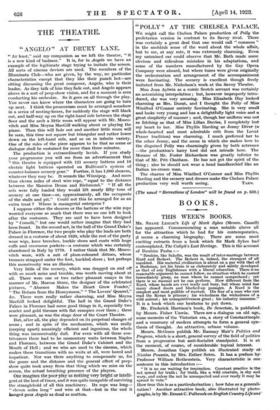THE THEATRE.
" ANGELO" AT DRURY LANE.
" AT least," said my companion. as we left the theatre, " it is a new kind of badness." It is, for- in Angelo we have an
example of the legitimate stage trying to imitate the screen.
All sorts of cinema devices are used. The members of the Illuminata Club—who are given, by the way, no particular characteristics except that they like their punch hot—are sitting discussing the great composer, Angelo, who is their leader. As they talk of him they fade out, and Angelo appears above in a sort of peep-show vision, and for a moment is seen conducting his orchestra. So itgoes on all through the play. You never can know where the characters are going to turn up next. I-think the proscenium must be arranged somehow in a series of nesting-boxes, for suddenly the stage will black out, and half-way up on the right-hand side between the stage floor and the arch a little room will appear with Mr. Mosco- vftch and Miss Moyne MaeGill walking about or playing the piano. Then this will fade out and another little room will be seen, this time not square but triangular and rather lower down on the left-hand side; and so on in infinite variety. One of the rules- of the piece appears to be that no scene or dialogue shall be sustained for more than three minutes.
The production is extraordinarily lavish. If you study your programme you will see from an advertisement that " this theatre is equipped with 121 scenery battens and 10 electric light battens operated on Bullivant's system of counter-balance scenery gear." Further, it has 1,000 sheaves, whatever they may be. It-sounds like Winnipeg. And more than eleven miles of steel wire rope, " equal to the distance between the Mansion House and Richmond." " If all the sets were fully loaded they would lift nearly fifty' tons of scenery at one time—or, approximately, all the occupants of The stalls and pit." Could not this be arranged for as an extra treat ? Where is managerial enterprise ?
I suppose either the sheaves or the battens or the wire rope worried everyone so much that there was no one left to look after the costumes. They are said to have been designed by " Comelli," but one would rather imagine that they had been found. In the second act, in the hall of the Grand Duke's Palace in Florence, the two people who play the leads are both dressed in a costume of about 1820, while the rest of the party wear wigs, knee breeches, buckle shoes and coats with huge cuffs and enormous pockets—a costume which was certainly abandoned- in Italy by 1770. I rather think that Mr. Mosco- vitch wore, with a suit of plum-coloured dittoes, whose trousers strapped under the foot, buckled shoes ; but perhaps this monstrosity was an illusion.
Very little of the scenery, which was dragged on and off with so much noise and trouble, was worth moving about at all. There were one or two rather pleasant essays in the manner of Mr. Marcus Stone, the designer of the celebrated pfctures, " Absence Makes the Heart Grow Fonder," " The Return from the Honeymoon," " The Lovers' Quarrel," &c. These were really rather charming, and Miss Moyne MacGill looked delightful. The hall in the. Grand Duke's Palace in Florence had some good things in it, especially two scarlet and gold thrones with flat canopies over them ; these were pleasant, as was the stage door of the Court Theatre.
But, after all, the play depended on. its perpetual changes of scene ; and in spite of the mechanism, which was really (carping apart) amazingly efficient and ingenious, the whole thing was inconceivably dull. For even with all these con- trivances there had to be momentary waits between Naples and Florence, between the Grand Duke's Cabinet and the Mouth of Hell ; and we who are used to the cinema, which makes these transitions with no waits at all, were bored and impatient. Nor was there anything to compensate us,- for the gauze and the distance and the general effect of peep- show quite took away from that' thing which we miss on the screen, the actual breathing presence of the players.
One imagines the poor play as nothing very bright or intelli- gent at the best of times, and it was quite incapable of surviving the stranglehold of all this machinery. Its rope was long- " eleven miles long" and wire at that—but in- the - end it hanged poor. Angelo as dead as mutton.










































 Previous page
Previous page